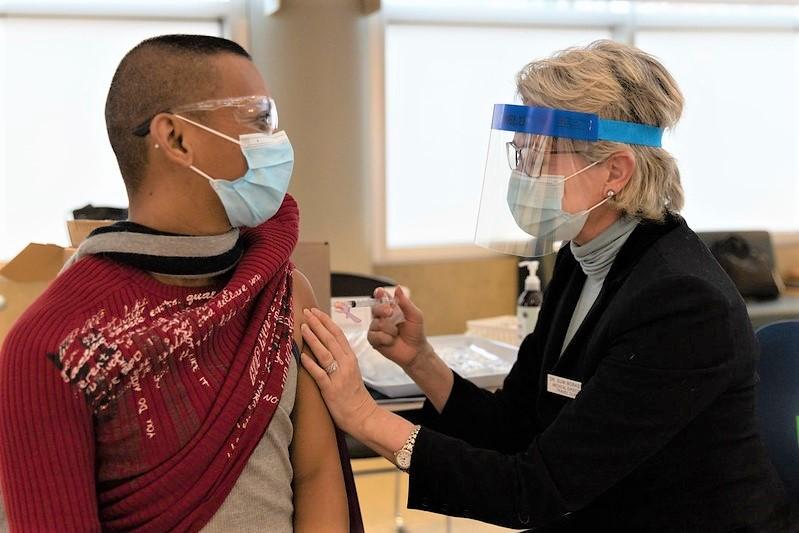The peer-reviewed data on both the Moderna and Pfizer-BioNTech COVID vaccines are in, demonstrating 94% to 95% protection from the disease.
The phase 3 clinical trial results for the Moderna COVID-19 vaccine, mRNA-1273, and the Pfizer-BioNTech COVID-19 vaccine, BNT162b2 or Comirnaty, were published late last week in the New England Journal of Medicine (NEJM). When compared with placebos, Moderna's vaccine showed 94.1% efficacy (95% confidence interval [CI], 89.3% to 96.8%), and Pfizer's had 95.0% efficacy (95% CI, 90.3% to 97.6%).
Both rates are for patients who received the two intended doses. Adverse events were uncommon in both studies.
"That the mRNA-1273 Covid-19 and the BNT162b2 Covid-19 vaccines protect with near-identical 94 to 95% vaccine efficacies—and that both vaccines were developed and tested in less than year—are extraordinary scientific and medical triumphs," writes Barton Haynes, MD, in a NEJM editorial on the Moderna study.
Eric Rubin, MD, PhD, and Dan Longo, MD, also use the word triumph to describe the Pfizer vaccine in their editorial, adding that, despite the further areas of research needed, the data are "impressive enough to hold up in any conceivable analysis."
The US Food and Drug Administration authorized the Pfizer vaccine on Dec 11 and the Moderna vaccine on Dec 18 and. Both make use of messenger RNA in lipid nanoparticles.
The authors of both papers aim to assess similar outcomes in future studies: long-term efficacy, uncommon or slow-to-surface side effects, and effects on asymptomatic infections and transmission rates.
Moderna trial aimed for representative demographics
In Moderna's phase 3 trial, also called COVE (Coronavirus Efficacy and Safety Study), 14,134 adults across 99 sites in the United States received two 100-microgram (mcg) dosages of the vaccine 28 days apart, with follow-ups continuing for a median of 64 days after the second dose.
When compared with 14,073 patients who received placebo, the researchers found 11 (0.1%) patients in the intervention group developed symptomatic COVID-19, compared with 185 (1.3%) in the placebo group. The only cases of severe COVID-19 infections occurred in the placebo group (0.2%). Data stratification by patients' age, sex, and race still showed consistent vaccine efficacy. The lowest rate was for those 65 and above (86.4%; 95% CI, 61.4% to 95.2%).
"The data suggest protection from severe illness, indicating that the vaccine could have an impact on preventing hospitalizations and deaths, at least in the first several months post-vaccination," says Lindsey Baden, MD, co-principal investigator for the study and lead author, says in a Brigham and Women's Hospital press release. Baden is an infectious disease specialist at Brigham, which was one of the study's locations.
The study's design tried to create a sample pool that reflected US racial demographics, including 20.5% of Hispanic or Latino background, 10.2% of black or African American background, and 4.6% of Asian descent, according to the press release. Additionally, 24.8% of patients were 65 and older, and 16.7% of those younger had comorbidities such as chronic lung disease, diabetes, or obesity.
Common side effects for the vaccine treatment were mild-to-moderate injection-site pain, headache, and fatigue. Overall, severe adverse events occurred in 0.5% of the intervention group and 0.2% of the placebo group, and none were classified as immediately life-threatening or as a cause of death.
People as young as 16 received Pfizer vaccine
In the Pfizer-BioNTech study, 18,508 people 16 years and older received the vaccine in two 30-mcg dosages 21 days apart.
During a follow-up that had a median duration of two months, 9 cases of symptomatic COVID-19 were found in the intervention group (0.05%), whereas 162 of the 18,435 people in the placebo group (0.9%) reported COVID-19 infections. Of the 10 severe COVID-19 cases, 9 occurred in the placebo group. Vaccine efficacy appeared to be consistent across racial backgrounds, age, and comorbidities.
"The study was not designed to assess the efficacy of a single-dose regimen," the researchers wrote. "Nevertheless, in the interval between the first and second doses, the observed vaccine efficacy against Covid-19 was 52%, and in the first 7 days after dose 2, it was 91%, reaching full efficacy against disease with onset at least 7 days after dose 2."
The study cohort was 82.9% white, 9.2% black, 27.9% Hispanic or Latino, and 4.2% Asian. Twenty-one percent had at least one pre-existing comorbidity, and 42.3% were older than 55 years. Almost 77% of the study cohort was located in the United States, but 15.3% were located in Argentina, 6.1% were in Brazil and 2.0% were in South Africa.
Similar to Moderna's vaccine, the most common adverse effects were mild-to-moderate injection-site pain, fatigue, and headaches, as reported by a subgroup of 8,183 people. Those younger than 55 experienced more injection-site pain and systemic symptoms than older patients.
"The frequency of any severe systemic event after the first dose was 0.9% or less. Severe systemic events were reported in less than 2% of vaccine recipients after either dose, except for fatigue (in 3.8%) and headache (in 2.0%) after the second dose," the researchers write. No vaccine-related deaths occurred in any study participant.





















